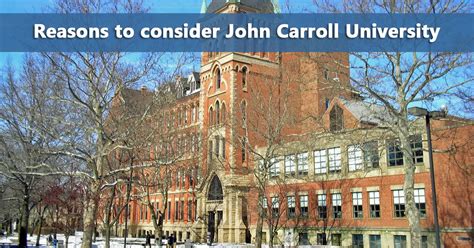Considering John Carroll University for your higher education? It’s a wise choice, but it’s essential to understand the financial implications before taking the plunge. Let’s break down the costs associated with attending this esteemed institution.

Tuition and Fees
The most significant expense is tuition, which varies depending on your program and enrollment status. For the 2022-2023 academic year, full-time undergraduate students can expect to pay $36,350. Graduate tuition ranges from $1,040 to $1,320 per credit hour.
Room and Board
Living on campus provides convenience and a vibrant college experience. John Carroll offers various housing options, with shared rooms starting at $5,495 per year and private rooms ranging from $7,263 to $9,430. Meal plans vary from $2,640 to $3,360 annually.
Books and Supplies
As a student, you’ll need textbooks and course materials, which can be costly. John Carroll estimates that undergraduate students spend an average of $1,000 per year on books and supplies.
Other Expenses
In addition to the primary costs, consider other expenses such as:
- Health insurance: $2,142 per year (waived if covered by a parent’s plan)
- Parking: $268 per year (if required)
- Transportation: Varies depending on mode of travel
- Personal expenses: Clothing, entertainment, and other miscellaneous costs
Financial Aid Opportunities
Recognizing the financial burden of higher education, John Carroll offers a range of financial aid options to help students bridge the gap. Approximately 92% of undergraduates receive some form of financial assistance.
- Scholarships: Based on academic merit, financial need, and other criteria
- Grants: Need-based aid that does not have to be repaid
- Loans: Government and private loans available to cover educational expenses
To determine your eligibility for financial aid, complete the Free Application for Federal Student Aid (FAFSA) each year.
Return on Investment
While the cost of education is substantial, it’s important to consider the return on investment. John Carroll graduates earn an average starting salary of $50,000, and within 10 years, their median earnings increase to $75,000. The university also boasts a 97% job placement rate within six months of graduation.
Tips for Saving on Costs
- Explore scholarships: Research and apply for scholarships that align with your interests and qualifications.
- Negotiate your financial aid package: Don’t be afraid to communicate your financial situation to the university and ask for additional assistance.
- Consider off-campus housing: While campus living offers convenience, off-campus apartments or shared rentals can be more affordable.
- Buy used textbooks: Save money on textbooks by purchasing used copies or renting them online.
- Take advantage of student discounts: Explore student discounts on transportation, entertainment, and other expenses.
Conclusion
Attending John Carroll University comes with a significant financial commitment. However, the high-quality education, career opportunities, and return on investment make it a worthwhile pursuit. By exploring financial aid opportunities and implementing cost-saving strategies, you can make the cost manageable and unlock the transformative power of a John Carroll education.
Additional Information
Table 1: Undergraduate Tuition and Fees (2022-2023)
| Type | Cost |
|---|---|
| Full-time | $36,350 |
| Part-time (per credit hour) | $1,212 |
Table 2: Graduate Tuition (2022-2023)
| Program | Cost |
|---|---|
| Master of Arts in Education | $1,040 per credit hour |
| Master of Business Administration | $1,320 per credit hour |
| Master of Science in Nursing | $1,080 per credit hour |
Table 3: On-Campus Housing Costs (2022-2023)
| Room Type | Cost |
|---|---|
| Double | $5,495-$6,360 |
| Triple | $5,495 |
| Single | $7,263-$9,430 |
Table 4: Meal Plan Costs (2022-2023)
| Plan | Cost |
|---|---|
| Unlimited | $3,360 |
| 12 meals per week | $3,120 |
| 10 meals per week | $2,980 |
| 8 meals per week | $2,840 |
| 6 meals per week | $2,640 |
